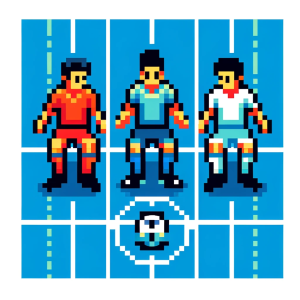
Revolutionizing Soccer Coaching: Insights from the Study ‘Cognition in Soccer and Futsal”
The world of soccer is evolving rapidly, not just in terms of physical training and tactics but also in understanding the cognitive aspects of the game. A study titled Cognition in Soccer and Futsal: Evidence of Validity of a 4-Instrument Protocol to Assess Executive Functioning Among Women Athletes sheds new light on the role of cognitive functions in soccer and futsal. This research has implications for soccercoaching and player development, especially among female athletes.
Understanding the Study
The study delves into how executive functions (EFs) – like working memory, inhibitory control, and cognitive flexibility – influence a player’s performance in soccer and futsal. It’s a known fact that soccer is a dynamic sport requiring physical prowess and high-level cognitive skills. The study’s novel approach lies in its 4-instrument protocol, providing a more standardized and comprehensive way to measure these cognitive functions.
Key Findings and Implications for Coaching
- Working Memory and Inhibitory Control: The study revealed that working memory and inhibitory control are more pronounced in elite players than their lower-division counterparts. This suggests that high-level training programs should incorporate mental exercises that focus on these areas to further improve player performance.
- Processing Speed in Making Assists: Interestingly, processing speed and visual working memory were linked to the ability to make assists among elite players. Coaches should consider drills that improve quick decision-making and visual tracking to develop players’ assist-making skills.
- No Significant Difference in Higher-Order EFs: Unlike previous research, this study did not find a significant difference in higher-order EFs between elite and lower-division athletes. This suggests that while core EFs are crucial, higher-level cognitive skills might not differentiate between various competitive levels as much as previously thought.
Applications in Soccer and Futsal Training
The findings of this study can revolutionize the way coaches approach training. Cognitive training alongside physical and technical drills could be the key to developing well-rounded athletes. For instance, exercises that improve working memory could involve complex play patterns, while those enhancing inhibitory control could focus on decision-making under pressure.
The Broader Impact
The study’s focus on female athletes adds invaluable knowledge to an area that has been less explored. It emphasizes the need for gender-specific research in sports science, providing insights that can be applied to develop tailored training programs for women in soccer and futsal.
Conclusion
This study is a testament to the evolving nature of sports science, highlighting the importance of cognitive functions in soccer and futsal. Coaches and training programs must adapt to these findings, integrating mental training into their regimes to develop more adept and versatile players. As the study shows, the key to the next level of performance in soccer could lie as much in the mind as in the body.



